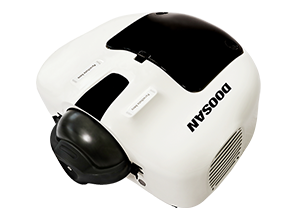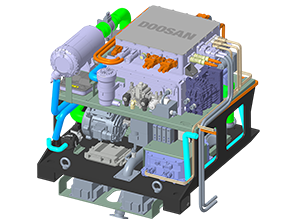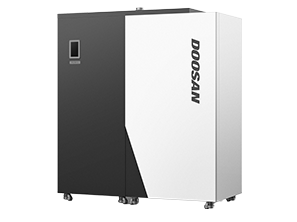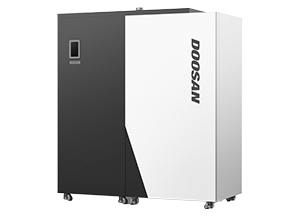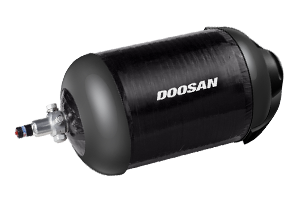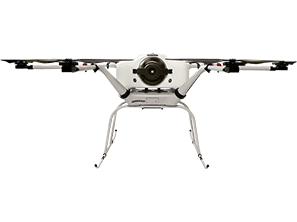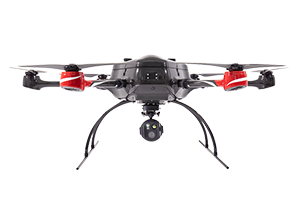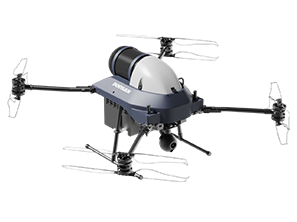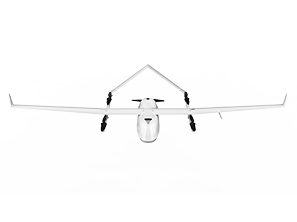뉴스
DMI Procures 831 Million won Drone Contract from Korean Army
- With Long Flight Time and Low Noise, Suitable for Surveillance
- Is Expected to be used by Air Force this November
- Is Expected to be used by Air Force this November
2021.05.17
Doosan Mobility Innovation (DMI) signed a contract to supply a 'hydrogen fuel cell drone' with the Defense Acquisition Program Administration (DAPA) through the rapid trial acquisition project system.
The contract is worth 831 million won, and after a six-month manufacturing and inspection process, military pilot operation is scheduled to begin in November for the Air Force.
DMI's hydrogen drone can fly for a long time compared to existing battery drones based on the high energy density of fuel cells, and has advantages of low noise and low vibration compared to gasoline drones, making it possible to perform covert surveillance and reconnaissance missions. If mission equipment is not installed, it can fly for more than 2 hours, and for more than 90 minutes based on electro-optical and infrared cameras.
The DAPA expects that the pilot project will serve as stepping stone to stimulate the establishment of hydrogen infrastructure (storage, transportation, charging, etc.) and the introduction of various fuel cell equipment (large drones, vehicles, armored vehicles, etc.) in the future.
The rapid trial acquisition project is a system for rapidly deploying the latest technology in the private sector. It has the advantage of being able to directly reflect the advanced performance of the existing weapon system by introducing and operating a small amount of products to the military within a short period of time (one year). It was designed to complement the existing weapon introduction system that takes time to deploy.
Choi Ho-cheon, head of the Future Power Business Division of the Defense Acquisition Program Administration, said, “The rapid trial acquisition project has been contributing to the development of advanced technologies and utilization of the military by rapidly applying private new technologies to the military over the past year and inducing private companies’ own investment.” We hope that many companies with technological competitiveness will participate so that they can apply various advanced technologies to the military in the future.”
DMI plans to expand the mission field of hydrogen drones by continuously discovering various sources of demand.
The contract is worth 831 million won, and after a six-month manufacturing and inspection process, military pilot operation is scheduled to begin in November for the Air Force.
DMI's hydrogen drone can fly for a long time compared to existing battery drones based on the high energy density of fuel cells, and has advantages of low noise and low vibration compared to gasoline drones, making it possible to perform covert surveillance and reconnaissance missions. If mission equipment is not installed, it can fly for more than 2 hours, and for more than 90 minutes based on electro-optical and infrared cameras.
The DAPA expects that the pilot project will serve as stepping stone to stimulate the establishment of hydrogen infrastructure (storage, transportation, charging, etc.) and the introduction of various fuel cell equipment (large drones, vehicles, armored vehicles, etc.) in the future.
The rapid trial acquisition project is a system for rapidly deploying the latest technology in the private sector. It has the advantage of being able to directly reflect the advanced performance of the existing weapon system by introducing and operating a small amount of products to the military within a short period of time (one year). It was designed to complement the existing weapon introduction system that takes time to deploy.
Choi Ho-cheon, head of the Future Power Business Division of the Defense Acquisition Program Administration, said, “The rapid trial acquisition project has been contributing to the development of advanced technologies and utilization of the military by rapidly applying private new technologies to the military over the past year and inducing private companies’ own investment.” We hope that many companies with technological competitiveness will participate so that they can apply various advanced technologies to the military in the future.”
DMI plans to expand the mission field of hydrogen drones by continuously discovering various sources of demand.


